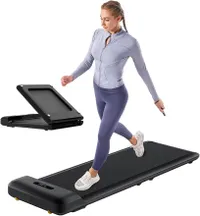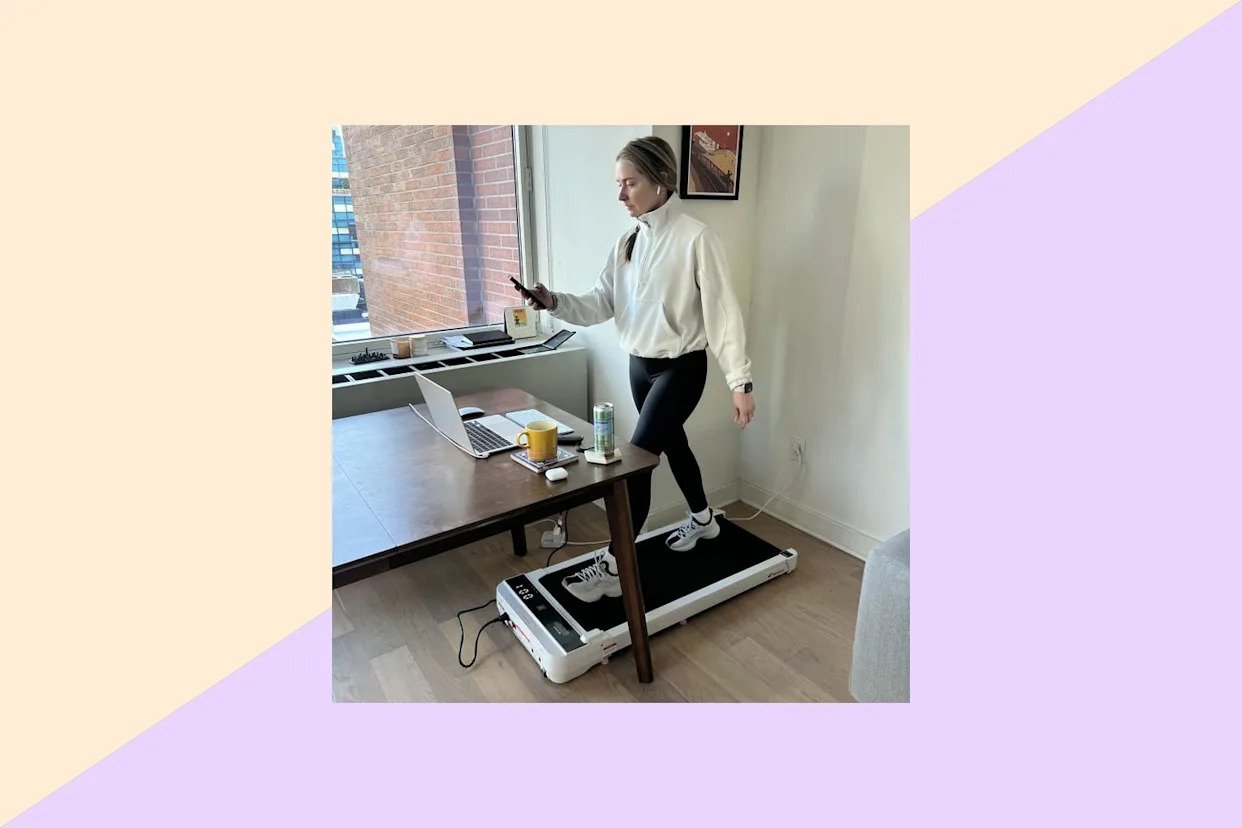Are you wondering how long you should walk on a walking pad each day to see real benefits? You’re not alone.
Finding the right balance can boost your energy, improve your mood, and help you stay healthy without feeling overwhelmed. But what’s the perfect daily walking time that fits easily into your busy schedule? Keep reading, and you’ll discover simple, effective tips to make every step count.
Your body—and mind—will thank you.

Benefits Of Daily Walking
Walking every day helps keep your body and mind healthy. It is an easy way to add exercise to your routine.
Using a walking pad lets you walk indoors anytime. This can improve your overall health in many ways.
Physical Health Gains
Daily walking strengthens your heart and lungs. It helps improve blood flow and lowers blood pressure.
Walking also builds muscle strength and joint flexibility. It reduces the risk of chronic diseases like diabetes.
- Improves cardiovascular health
- Strengthens muscles and bones
- Increases joint flexibility
- Reduces risk of chronic illnesses
Mental Well-being
Walking daily can boost your mood. It helps reduce stress and anxiety by releasing feel-good chemicals.
It also improves focus and mental clarity. Regular walking can lead to better sleep and less fatigue.
- Reduces stress and anxiety
- Boosts mood and happiness
- Improves concentration
- Enhances sleep quality
Weight Management
Walking helps burn calories and keeps your metabolism active. It supports healthy weight loss or maintenance.
Using a walking pad daily makes it easier to stay active. Consistent walking controls appetite and fat buildup.
- Burns calories efficiently
- Supports weight loss and maintenance
- Keeps metabolism steady
- Controls appetite and fat gain
Factors Influencing Walking Duration
Walking on a walking pad is a great way to stay active. The time you spend walking daily depends on several factors. Understanding these can help you set a healthy routine.
Everyone is different, so the best walking time varies. Consider your fitness level, health, and daily schedule to find what works best for you.
Fitness Levels
Your current fitness level affects how long you should walk. Beginners may start with shorter sessions. More fit people can walk longer safely.
Walking too long too soon can cause fatigue or injury. Increase your walking time gradually as your fitness improves.
- Beginners: 10-15 minutes daily
- Intermediate: 20-30 minutes daily
- Advanced: 30-60 minutes daily
Health Conditions
Health issues can limit walking time. People with joint pain or heart conditions should be cautious. Talk to a doctor if unsure.
Adjust walking duration based on how your body feels. Rest if you experience pain or discomfort during walking.
- Chronic pain: Start slow and monitor pain
- Heart conditions: Follow medical advice
- Respiratory issues: Keep sessions short
Daily Schedule
Your daily routine affects how much time you can spend walking. Busy schedules may limit walking time. Find small breaks to stay active.
Consistency is key. Even short daily walks add up. Choose times that fit your day best to build a habit.
- Morning walks boost energy
- Lunch breaks fit short sessions
- Evening walks help relax
Recommended Walking Times
Using a walking pad daily can improve your health and fitness. It is important to know how long to walk each day.
This guide helps you find the right walking time based on your experience level.
Beginners
Beginners should start slow to avoid injury and fatigue. Begin with short sessions and increase gradually.
Try walking 10 to 15 minutes daily at a comfortable pace. This helps your body get used to regular exercise.
- Start with 10-15 minutes per day
- Walk at a slow, steady pace
- Rest if you feel tired or sore
Intermediate Walkers
Intermediate walkers can increase their time and speed. This helps build endurance and burn more calories.
A daily walk of 20 to 30 minutes is good. You can add some light intervals of faster walking.
- Walk 20-30 minutes each day
- Include short bursts of faster walking
- Keep a steady pace most of the time
Advanced Users
Advanced users can walk longer and at a higher speed. This helps improve fitness and stamina.
Walking 45 minutes to 1 hour daily is suitable. Mix steady walking with intervals of speed or incline if available.
- Walk 45-60 minutes daily
- Use intervals of fast walking or incline
- Focus on maintaining good form

Ideal Walking Pad Settings
Using a walking pad daily helps improve your health and fitness. Setting it right ensures you get the best results safely.
Adjusting speed, incline, and session frequency helps match your walking pad use to your goals and fitness level.
Speed Selection
Choose a speed that feels comfortable but challenges you. Start slow if you are new to walking pads.
Most people find 2 to 3 miles per hour good for daily walking. You can increase speed as your fitness improves.
- Begin with 1.5 to 2 mph for warm-up
- Use 2 to 3 mph for steady walking
- Try 3 to 4 mph for brisk walking
Incline Options
Incline adds intensity and helps work different muscles. Use low incline settings to avoid strain.
Start with 1% to 3% incline to feel a gentle challenge. Increase incline gradually if you want more effort.
- 0% incline for easy walking
- 1% to 3% incline for moderate workout
- 4% to 5% incline for higher intensity
Session Frequency
Daily walking is best for health benefits. Aim for at least 20 to 30 minutes per session.
Try walking on your pad 5 to 7 days a week. Rest days help your muscles recover and avoid injury.
- 20 to 30 minutes per session
- 5 to 7 sessions per week
- Rest or light activity on off days
Tips For Maximizing Walking Pad Use
Using a walking pad daily is a great way to stay active. It helps improve your health and burn calories.
To get the most from your walking pad, focus on good habits. These tips will help you use it safely and effectively.
Proper Posture
Keep your back straight and your shoulders relaxed while walking. Avoid leaning forward or backward.
Look straight ahead, not down at your feet. This helps prevent neck strain and keeps your balance steady.
Footwear Choices
Wear comfortable shoes with good support. Avoid shoes with slippery soles or high heels.
- Choose shoes with cushioned soles to reduce impact
- Pick breathable materials to keep feet cool
- Make sure shoes fit well to prevent blisters
Hydration And Breaks
Drink water before, during, and after your walk. Staying hydrated helps your body work better.
Take short breaks if you feel tired. Resting prevents injury and keeps your energy up for longer walks.

Tracking Progress And Staying Motivated
Walking on a walking pad daily can improve your health. It helps to track your progress and stay motivated.
Tracking shows how much you walk and helps you keep going every day.
Using Apps And Devices
Many apps and devices can track your walking time and steps. They give clear data to see your progress.
Some devices even show calories burned and walking speed. This info can help you improve your routine.
- Track steps taken daily
- Monitor walking time
- Check calories burned
- Set reminders to walk
Setting Goals
Set small daily goals for walking time or steps. Goals give you a clear target to reach each day.
Start with easy goals and increase them slowly. This keeps you motivated without feeling tired.
- Decide how long to walk daily
- Choose a step count goal
- Increase goals gradually
- Write down your targets
Reward Systems
Reward yourself when you reach your walking goals. Rewards make the habit more fun and help you keep it up.
Choose simple rewards like breaks or treats. This encourages you to walk every day.
- Take a short rest after walking
- Enjoy a favorite healthy snack
- Buy small gifts for milestones
- Share progress with friends
Frequently Asked Questions
How Long Should Beginners Walk On A Walking Pad Daily?
Beginners should start with 10 to 15 minutes daily. Gradually increase time as stamina improves. This avoids fatigue and injury. Consistency is key for building endurance safely.
What Is The Ideal Walking Pad Duration For Weight Loss?
Walking 30 to 60 minutes daily on a walking pad aids weight loss. Combine with a balanced diet for best results. Longer sessions burn more calories and improve metabolism effectively.
Can Walking Too Long On A Walking Pad Cause Harm?
Yes, excessive walking can lead to joint pain or muscle strain. Listen to your body and take breaks. Aim for balanced, moderate daily walking to avoid overuse injuries.
How Often Should I Use A Walking Pad Weekly?
Using a walking pad 5 to 6 times a week is optimal. This frequency supports cardiovascular health and fitness gains. Rest days help recovery and prevent burnout.
Conclusion
Walking on a pad daily boosts health. Aim for 30 minutes. Consistency matters more than speed. Listen to your body. Adjust time based on energy levels. Start slow if you’re new. Gradually increase duration as you feel comfortable. Walking improves mood, fitness, and overall wellness.
Stay hydrated and wear comfortable shoes. Walking daily can be a simple, effective habit. Make it a part of your routine. Enjoy the benefits of better health and well-being. Remember, every step counts towards a healthier lifestyle. Keep moving, and enjoy your daily walk.



